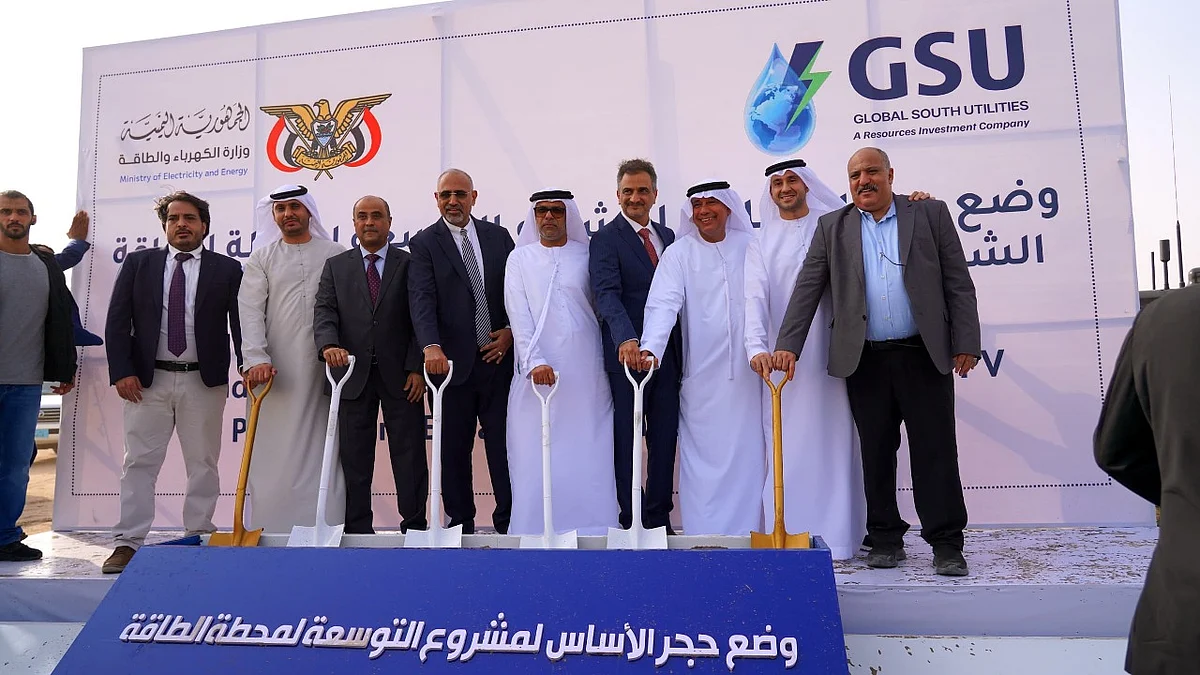
UAE Provides Clean Electricity To Over One Million Homes In Yemen
UAE-based company Global South Utilities has contributed to Yemen's electricity sector, by commissioning the Shabwah Solar Power Plant, and expanding the Aden Solar Power Plant, in cooperation with Yemen's Ministry of Electricity and Energy.
According to GSU, which is part of part of Abu Dhabi's Resources Investment, the Shabwah Solar Power Plant is now operational, supplying clean electricity to around 330,000 households, while the Aden Solar Power Plant will deliver power to 687,000 households upon completion in 2026.
Recommended For You Dubai resident becomes one of UK's youngest solicitors at 21Taken together, the two projects will provide clean electricity to over one million homes, making this the largest initiative of its kind in Yemen's clean power sector.
Stay up to date with the latest news. Follow KT on WhatsApp Channels.
On 28 August, GSU inaugurated the Shabwah Solar Power Plant in Ataq, Shabwah Governorate, with a generation capacity of 53 megawatts and a 15 MWh battery storage system.
Located adjacent to Ataq University, the facility will produce about 118,642 MWh of clean electricity annually and reduce carbon dioxide emissions by nearly 62,727 tonnes each year - equivalent to the emissions from tens of thousands of cars.
Infrastructure works include 85,644 solar panels, six transformer stations, a central monitoring and control building, and a 15-kilometre overhead transmission line connecting the plant to the national grid via 51 towers.
Electricity from the plant will fully meet the needs of Ataq City and six surrounding districts - Al-Saeed, Al-Musayni'ah, Jardan, Nisab, Markhah, and Habban - powering homes, schools, and healthcare facilities while enabling local economic growth.
Also on 28 August, GSU launched the second phase of the Aden Solar Power Plant in Bir Ahmed, adding 120 MW of capacity to the current output. Once complete in 2026, the plant's total capacity will reach 240 MW, making it the largest solar power project in Yemen.
The second phase alone will generate about 247,000 MWh of electricity annually and cut roughly 142,000 tonnes of CO2 emissions each year. Combined with Phase One, total annual emission reductions will reach about 285,000 tonnes - equivalent to removing more than 85,000 cars from the road. The expansion includes the installation of over 194,000 solar panels, further enhancing energy security and improving air quality.
Ali Al Shimmari, Managing Director and CEO of GSU, told WAM:“Delivering clean and reliable electricity to more than one million homes in Aden and Shabwah is not just an engineering achievement, but a vital step towards improving people's lives and strengthening economic and social stability. These projects reflect our vision of connecting communities to sustainable development opportunities and placing renewable energy at the heart of growth.”
He added that investment in renewable energy is essential to improving quality of life, reducing dependence on fuel imports, and enhancing resilience to climate change.

Legal Disclaimer:
MENAFN provides the
information “as is” without warranty of any kind. We do not accept
any responsibility or liability for the accuracy, content, images,
videos, licenses, completeness, legality, or reliability of the information
contained in this article. If you have any complaints or copyright
issues related to this article, kindly contact the provider above.
Most popular stories
Market Research

- Forex Expo Dubai 2025 Returns October 67 With Exclusive Prize Draw Including Jetour X70 FL
- Xfunded Expands In Dubai, Strengthening Collaborations With Trading Influencers Across Europe
- SPAYZ.Io White Paper Explores Opportunities, Challenges And Ambitions In Payments Industry
- B2BROKER Taps Finery Markets To Power Institutional Crypto OTC On B2TRADER
- Zebu Live 2025 Welcomes Coinbase, Solana, And Other Leaders Together For UK's Biggest Web3 Summit
- Daytrading Publishes New Study Showing 70% Of Viral Finance Tiktoks Are Misleading




















Comments
No comment